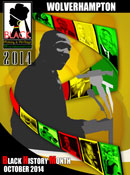Slavery and Abolition
Slavery and Abolition Key Events
All parts of Britain were heavily involved in the slave trade, not just port cities such as London, Liverpool and Bristol. The country’s industrial centres, including Birmingham and the Black Country, produced goods that were traded in exchange for slaves, and imported goods produced by slave labour. Many wealthy families in the 18th century also had black servants, men and women who were originally sold as slaves but later brought to Britain.
Just as profits from the slave trade touched all classes in society, so people throughout Britain were also involved in its abolition. Following the example of many black campaigners and writers such as Ignatius Sancho and Olaudah Equiano, local abolition groups sprung up all over the country, often led by some of the more radical non-conformist churches, of which Birmingham and Wolverhampton had a high concentration. These groups raised funds and continued to lobby parliament for a complete abolition of slavery, and in their campaign one can see echoes of today's protest and other movements.
1562 - First English slaving expedition
1625 - First English settlement on Barbados
1626 - First boatload of African slaves to St. Kitts
1672 - Royal Africa Company granted charter to carry Africans to the Americas
1778 - Slavery declared illegal in Scotland
1787 - Society for the Abolition of the Slave Trade founded
1791 - 23 August - Slave revolt on St Domingue (Haiti)
1792 - Resolution for gradual abolition of slave trade defeated in House of Lords
1805 - Bill for abolition passed in Commons, rejected by House of Lords
1807 - 25 March – Slave Trade Abolition Bill passed in British Parliament
1808 - British West Africa Squadron (Royal Navy) established to suppress slave trading.
1838 1 August – enslaved men, women and children in British Empire finally became free after a period of enforced apprenticeship following the passing of the Slavery Abolition Act in 1833
[Wolverhampton Archives and Local Studies]
 Black History & Heritage recognises Black Wulfrunians
Black History & Heritage recognises Black Wulfrunians
